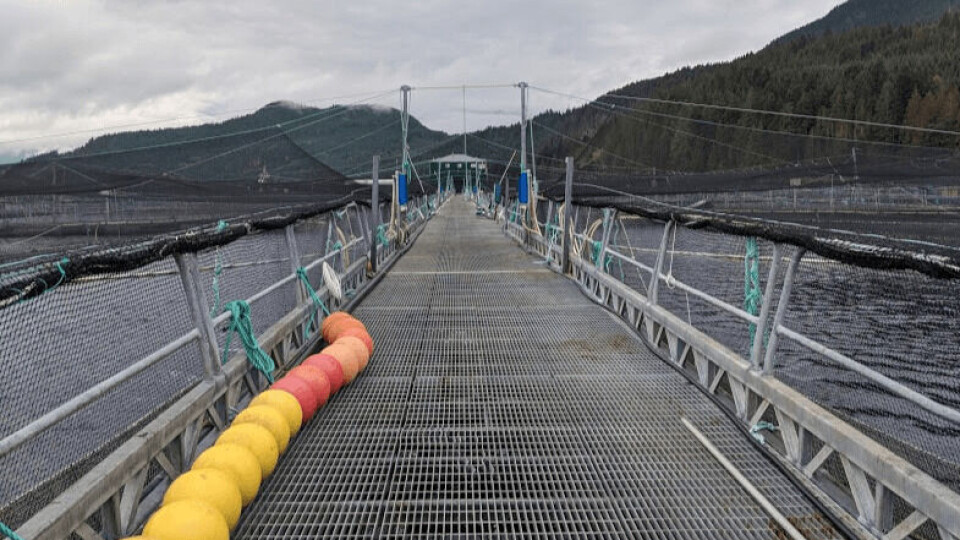
BC First Nations to oversee phase-out of up to 17 sites
A historic agreement has been reached in British Columbia (BC) between the aquaculture industry, First Nations and government. Under the Indigenous Monitoring and Inspection Plan (IMIP) local First Nations will oversee the closure of fish farms in the Broughton Archipelago.
The ‘Namgis, Kwikwasut’inuxw Haxwa’mis and Mamalilikulla First Nations have reached an agreement with Cermaq Canada, Mowi Canada West and the Department of Fisheries and Oceans.
“The IMIP will provide important First Nations oversight during an orderly transition of 17 fish farm sites between 2019 and 2023. Five farms have already been decommissioned, while others will remain in operations for various terms (two to four years). By the end 2022, 10 farms will have ceased operations,” said a joint statement released by Mowi Canada West, Cermaq Canada and the local First Nations.
Meaningful discussions
“The remaining seven farms will cease operations, unless agreements by First Nations and farm operators, and valid Fisheries and Oceans Canada (DFO) licences, are in place by 2023.
“The IMIP will establish First Nations oversight of fish farms operating in the territories of the First Nations during the orderly transition of fish farms in the area over the next four years. The First Nations and the two companies have engaged in significant and meaningful discussions over the past nine months to develop this comprehensive monitoring and oversight program.
“Establishing an IMIP was one of many significant recommendations to come out of a ground-breaking government-to-government process undertaken by the First Nations and the Province of B.C. following a letter of understanding (LOU) regarding the future of finfish aquaculture in the Broughton area,” said the statement.

Funding
The Nations involved in the IMIP will receive over $7 million in funding through the BC Salmon Restoration and Innovation Fund (BCSRIF) over the coming years to support the program. Cermaq Canada and Mowi Canada West are also providing funding and in-kind support to the program.
“Stewardship in our territories is a sacred trust and responsibility, a commitment to future generations that we will protect the land, resources and waters in our territories far into the future. The IMIP agreements are important tools that will enhance the ability of our Nations to fulfill this responsibility as well as improve transparency by providing trusted information to our members and the public about the interactions of farm operations and marine resources,” said Chief Richard Sumner of the Mamalilikulla First Nation.
Public Reporting
“The IMIP is being implemented immediately with program activities expanding over the first year as the First Nations build internal capacity. It will see First Nations leading the monitoring of fish health, sea lice, pathogens, disease agents and diseases before and after introduction of fish into the fish farms. It has been agreed smolts positive for piscine reovirus will not be transferred into saltwater and corrective measures include removal of fish from farms if treatment for sea lice is unsuccessful in meeting thresholds.
“The program will improve public reporting and have compliance and corrective measures if the required standards are not met by fish farm operators. This agreement reinforces the importance of supporting wild salmon populations while building capacity within the First Nations and working in a transparent manner with industry,” said the joint statement.

Wild salmon
“We are incredibly pleased with the outcome of this process and would like to thank the Nations involved for their willingness to work with us and allow us to participate in the development of this precedent-setting program and agreement,” said David Kiemele, managing director for Cermaq Canada.
“For Cermaq Canada, this plan is important in terms of reconciliation and reflects Cermaq Canada’s ongoing approach to doing business in First Nations territories. Cermaq is committed to move forward, together, in a way that will help to protect and enhance wild salmon populations, with the goal of building capacity, relationships and trust.”
Diane Morrison, managing director for Mowi Canada West, said: “This agreement is so important to the 600 people who work for Mowi and the hundreds of contractors that support our salmon farming operations. I am grateful for the vision and efforts of the First Nations leaders we have deeply engaged with over the past number of months. Mowi believes strongly in equitable and meaningful relationships with First Nations in BC.”






















































